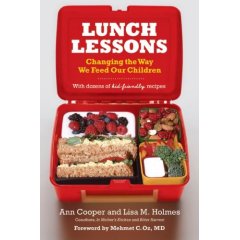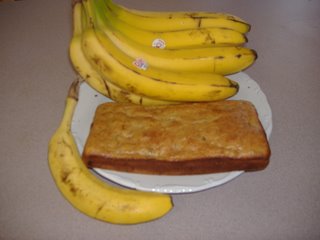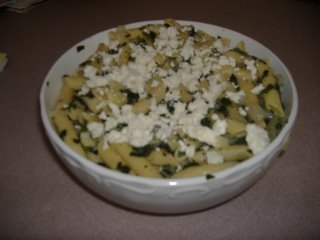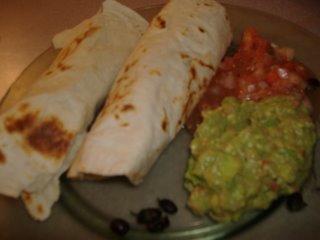Lunch Lessons.
I’ve always been interested in cooking, nutrition, and food in general. I love cookbooks, and have always felt that what a community eats and the way they eat it speaks volumes about the culture. Which is why one of the reasons I also strongly believe that our culture is in big trouble. As society becomes increasingly anti-intellectual and more disposable, and the men who hold the power mock and belittle those who warn us of the hazards of permanently polluting the food chain (and financially reward the most successful polluters), our collective health and well-being takes a nosedive.
Lunch Lessons, a Clarion call to change the way we feed our children, addresses several of these issues and tackles the often-odious school lunches that our children are fed, often provided by fast food companies and/or the lowest bidder.
The book starts off strong, providing the reader with a rundown on basic childhood nutrition and the correct portion size for each age group. Several helpful tips are also given to get your child to enjoy healthy foods and have a good relationship with eating. One of the best ways to make a connection to healthy eating and the importance of a healthy earth is according to the book, getting children involved in gardening when they are young.
I believe this to be true just watching how much my children enjoy gardening and growing watching their food grow from tiny seedlings to the plump tomatoes in their salad.
The book begins to overwhelm, however, when it begins the endless list of toxic products and recommends that the reader buy mostly organic food and clean with organic products. Although I of course agree with this theory in principle, in reality most people, especially poorer families who are in greater need, can not afford to buy organic, which is much more expensive than the family-sized box of processed macaroni and cheese at Costco. And gardening takes both time and space, a luxury that many families can not afford.
Which leads neatly into the segue of a large part of the book’s focus: overhauling the lunch programs in the public school system. Authors Ann Cooper and Lisa Holmes give several examples of communities where it was done, and unsurprisingly, it’s places like Malibu and Berkeley, Appleton, Wisconsin (a community with a large organic bakery that sells its products nationally), and New York City. In almost all of these cases, the overhaul was sparked by a well-connected chef (the legendary Alice Waters) or an executive in the food industry. I would love to change the way food is served and taught in the Chicago public school system, so a step-by-step plan of action for a stay-at-home mom or a mom who works as an accountant would have worked much better alongside all those inspirational examples.
Overall, the text of the book left me more overwhelmed than inspired, but the main draw, for me, was the recipes. I chose to make four of the suggested meals, using ingredients I already had in the home and grocery shopping at Trader Joe’s, a more reasonably-priced source for natural foods. I made 2 breakfasts, banana bread and low-fat scones, and two lunches, pasta with spinach and feta and a Spinach burrito (now that it’s apparently okay to eat spinach again.)
The grocery bill for at Trader Joe's for the four recipes came to $47. Admittedly, the pantry was pretty bare at home to begin with. I had eggs and flour, but I was missing expensive items like pure vanilla extract and the berries for the scones, both five bucks. Illinois families who are relying on government aid get, at the most, $386 a month for a family of four. If my math is correct, that's about $1.15 a meal per person. These four meals (per person) total about $3.96. Much better than eating in a restaurant, but still more than a poor family can afford. This lends a lot of strength to the argument for figuring out a way for the public school systems to provide organic breakfasts and lunches. That being said, if you're in the bracket where you can afford to buy fresh, natural produce on a regular basis, you should seriously consider buying Lunch Lessons for the recipes alone, because they were a huge hit with the whole family.
That being said, if you're in the bracket where you can afford to buy fresh, natural produce on a regular basis, you should seriously consider buying Lunch Lessons for the recipes alone, because they were a huge hit with the whole family.
My family fell on the banana bread and tore it apart like a pack of wild dogs. This was by far the biggest hit, and the only fault was that the recipe should have been quadrupled to keep up with demand. Also somewhat popular was the Penne pasta with spinach and feta. Pasta is a staple of lower income families, and Trader Joe's offers a pound of organic penne for 69 cents. I used frozen spinach (99 cents) and feta (2.19 a pound). Everything else I had in the house, so this meal came to about 97 cents per person - doable for just about any level of income, flavorful, delicious, and only took about 30 minutes to prepare. Even my picky eater forced down half a plateful.
Also somewhat popular was the Penne pasta with spinach and feta. Pasta is a staple of lower income families, and Trader Joe's offers a pound of organic penne for 69 cents. I used frozen spinach (99 cents) and feta (2.19 a pound). Everything else I had in the house, so this meal came to about 97 cents per person - doable for just about any level of income, flavorful, delicious, and only took about 30 minutes to prepare. Even my picky eater forced down half a plateful. The scones were not as popular, but I think that was partly my fault, as the raspberries I selected were too sour, and the dough was too sticky to cook in the ten minutes the recipe recommended.
The scones were not as popular, but I think that was partly my fault, as the raspberries I selected were too sour, and the dough was too sticky to cook in the ten minutes the recipe recommended.
The biggest dinner hit was the spinach and black bean burrito, and I went so far off the recipe here, I had reservations about even mentioning it. I made guacamole, which the recipe didn't ask me to do, and I scrapped the salsa recipe in the book for the one in Rick Bayless' Mexican Kitchen, used canned beans instead of dried, used granulated garlic instead of fresh, fresh tomatoes instead of canned, frozen spinach instead of fresh, and threw in some leftover chopped chicken from last night's dinner and the sour cream I'd bought for the banana bread. My conclusion? It's really hard to screw up a burrito. My family gorged on it, and my seven-year-old fell in love with me, saying, and I quote, "Of all the mommies in the world, you are the best burrito maker ever."
My conclusion? It's really hard to screw up a burrito. My family gorged on it, and my seven-year-old fell in love with me, saying, and I quote, "Of all the mommies in the world, you are the best burrito maker ever."
And that's the reason why we signed up for this motherhood gig, right? That compliment is worth the price of the book right there.
_________________________
Lunch Lessons
by Ann Cooper and Lisa Holmes
September 2006 by Harper Collins
Hardcover, 272 pp
ISBN: 0-06-078369-9
Wednesday, October 04, 2006
<< Home
